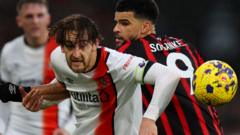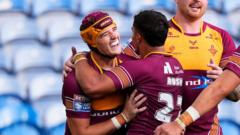How Did Footballer Lockyer Reunite with the Medics Who Saved His Life?

Tom Lockyer's Life-Saving Reunion with Medical Heroes
In a heartfelt reunion that underscores the importance of quick and effective emergency response, former Wales footballer Tom Lockyer met the medical team that saved his life after he suffered a cardiac arrest on the field. A critical incident unfolded on December 16, 2023, during a Premier League match against Bournemouth, where Lockyer, the captain of Luton Town, collapsed mid-game. This article delves into the harrowing details of that day, the remarkable actions taken by the medical staff, and Lockyer's journey since that life-changing moment.
The Incident: A Heart-Stopping Moment
Lockyer's collapse was sudden and shocking. In front of thousands of fans, his heart stopped beating for a terrifying two minutes and 41 seconds. The swift reaction from paramedics from the South Western Ambulance Service was crucial. They arrived on the scene quickly, utilizing a defibrillator to restart his heart. Lockyer later expressed his gratitude, saying, “I had my heroes on that night.” This powerful sentiment highlights the critical nature of prompt medical intervention in emergencies, especially in high-stakes environments like professional sports.
Behind the Scenes: The Medical Response
The first responder on the pitch was Chris Phillips, one of Luton's physiotherapists. He was no stranger to emergencies, having been present during Lockyer's previous health scare at Wembley Stadium just months prior. Phillips understood the gravity of the situation immediately and acted swiftly. “You weren’t responding to anything that we asked of you,” he recounted, emphasizing the urgency of the moment. His experience and training allowed him to coordinate effectively with the medical team, ensuring that Lockyer received critical care without delay.
Teamwork in Crisis
One of the remarkable aspects of the response was the seamless collaboration between the away team’s medical staff and those of Bournemouth. It is standard practice for visiting team medics to brief their home counterparts about any potential health issues with players. This protocol allowed the Bournemouth medics to quickly assess the situation and suspect a heart-related problem, further expediting the lifesaving measures taken.
Lockyer's Experience During the Incident
Lockyer's memories of the incident are both vivid and haunting. He recalls waking up after the defibrillator was used, surrounded by voices but unable to respond. “I couldn’t move, I couldn’t speak. I was thinking, ‘I’m good,’ but nothing was coming out,” he said, reflecting on the shock of the situation. This moment of helplessness was overshadowed by the fear that he might not survive. The emotional weight of the crowd's silence, as fans began to realize the gravity of the situation, added to the intensity of the moment.
Impact on Lockyer's Life
The aftermath of the incident profoundly affected Lockyer's life. He now has a small defibrillator implanted in his chest as a precaution against future cardiac arrests. However, the physical impact was not the only challenge he faced. Lockyer admitted to experiencing an identity crisis, stating, “For 20 years I had been Tom Lockyer the footballer, and that was snatched away from me overnight.” The mental struggle of redefining his identity outside of football has been difficult, but he is determined to use his experience to help others.
Advocacy for Heart Health
Today, Lockyer is not merely a survivor; he is an ambassador for the British Heart Foundation. His passion for promoting resuscitation training is palpable. He encourages everyone to take just 15 minutes to learn lifesaving skills from the charity’s website. “You can be a hero for someone you love,” Lockyer emphasizes, showcasing the power of knowledge and preparedness in saving lives. His message resonates deeply, particularly in the context of sports and physical activity, where such incidents can occur unexpectedly.
The Importance of Emergency Preparedness
The events surrounding Lockyer's cardiac arrest serve as a stark reminder of the importance of emergency preparedness in sports, workplaces, and public spaces. Here are some key takeaways regarding emergency response:
- Rapid Response: Quick action can save lives. The faster medical personnel can intervene, the better the chances of survival.
- Training and Education: Basic CPR and first aid training should be widely accessible and encouraged among the public. Knowing how to use a defibrillator can make a significant difference.
- Collaboration: Medical teams must work together efficiently, sharing critical information to ensure patient care is top-notch.
- Public Awareness: Increasing awareness about heart health, especially among athletes, is essential. Regular health screenings and knowledge of personal health conditions can mitigate risks.
FAQs About Cardiac Arrest and Resuscitation
What is cardiac arrest?
Cardiac arrest occurs when the heart suddenly stops beating, preventing blood from flowing to the brain and other vital organs. It can be triggered by various factors, including heart disease, arrhythmias, or trauma.
How can I perform CPR?
CPR involves chest compressions and rescue breaths. If you witness someone collapse, call emergency services immediately and begin chest compressions at a rate of 100 to 120 compressions per minute until help arrives.
What is a defibrillator, and how does it work?
A defibrillator is a device that delivers an electric shock to the heart to restore its normal rhythm. It can be used by trained individuals or through automated external defibrillators (AEDs) that provide audible instructions.
How can I get trained in CPR and first aid?
Various organizations offer CPR and first aid training courses. Check with local hospitals, community centers, or the British Heart Foundation for available classes and resources.
What should I do if I experience heart issues?
Seek immediate medical attention if you experience symptoms such as chest pain, shortness of breath, or dizziness. It's essential to consult a healthcare professional for proper diagnosis and treatment.
Tom Lockyer's story is a powerful testament to the impact of quick action and the importance of being prepared for medical emergencies. His commitment to heart health advocacy not only reflects his personal journey but also serves as a beacon of hope and awareness for many. As we reflect on his experience, consider this: What steps are you taking to educate yourself and others about heart health? #HeartHealth #CPR #LifesavingSkills
Published: 2025-08-07 05:10:13 | Category: wales



